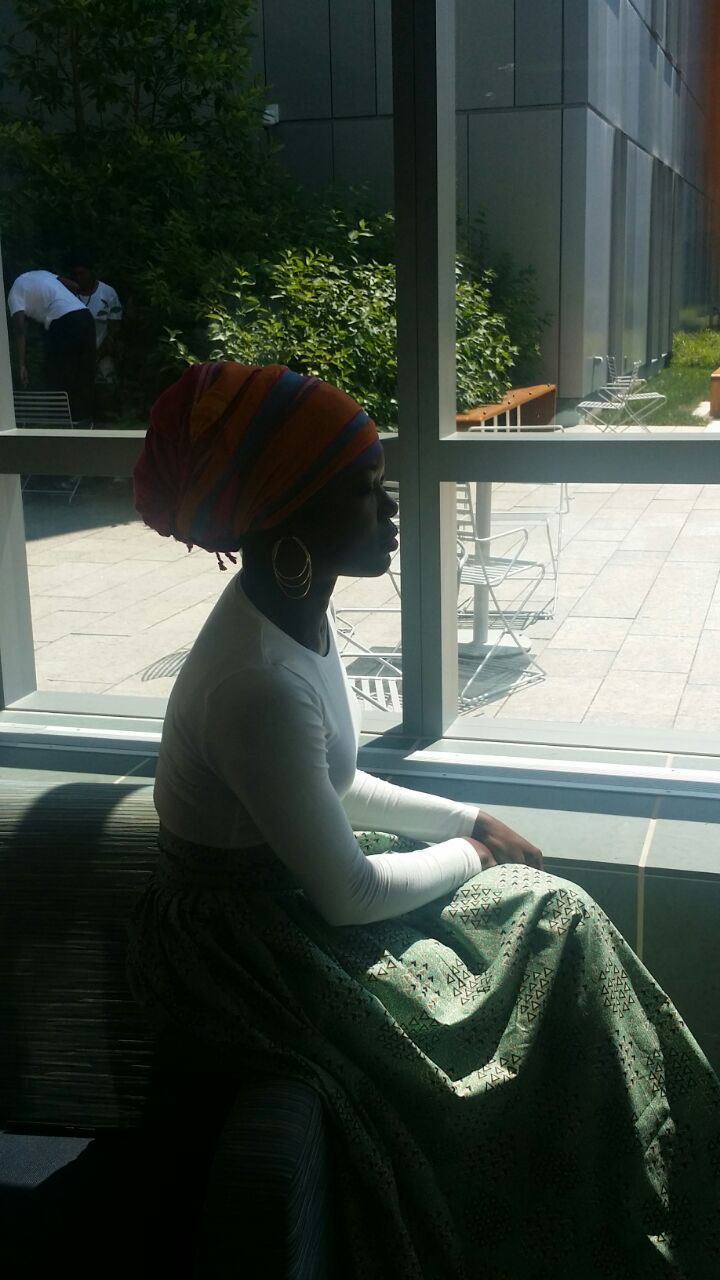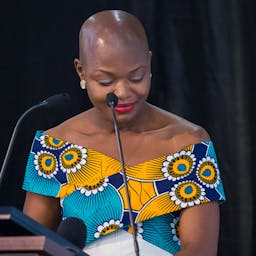The Internet restored my Voice before Doctors did
May 28, 2019
Story

Who am I? That simple question has plagued me for years. I am still in search of a definitive answer. Because over the years my identity has evolved, then dissolved, revolved, involved and now slowly evolving again.
At 15, I knew who I was – my identity evolving. The records would affirm that I was an Intelligent, athletic, popular, fun loving and outgoing girl. I was even the queen of my school house during our yearly inter-house sports competition, two years consecutively. At that time, 13 years ago, the world was my oyster.
Then at 16, I was clueless – my sense of self, my identity, my self-worth was taken away from me with a surgery that lasted a little over 60 minutes. That act of professional recklessness - paralyzed my vocal cords and dissolved my identity before my very eyes – taking away my ability to speak and breathe without the aid of a tube. In essence, rendering me voiceless, literarily and figuratively. I involved myself in the art of sign language at my lowest. Inspirational writer Laurie Halse Anderson, truthfully said “I wonder how long it would take for anyone to notice if I just stopped talking… When people don't express themselves, they die one piece at a time.”
No one prepared me for life with an acquired disability. In a space of 6 months, I had gone from the popular girl very confident in her abilities to an emotional and psychological wreck – I withdrew from my tertiary studies, I always wore a scarf around her neck, I could no longer play sport, I no longer had an opinion, why, when I couldn’t even say my name. Who was this person? Who am I?
For the next 4 years I set up a support group for other women and girls who have suffered similar fate as me. I used sign language and the internet, I utilised social media to seek out and support those who were survivors of reckless, rampant medical callousness. Though without functioning vocal cords, I spoke strongly with my pen and the stroke of my keyboard. The internet gave me a voice at a time I could not speak -literally.
In the second year of my speechlessness, with the help of my family, I travelled abroad for pioneering treatment. There I met Prof McIntosh – a good man trained in Scotland but practicing in South Africa. He made me realise that the 1 hour or so surgery that took so much (in fact my life) from me was not just totally unnecessary but also negligent. Following two extensive restorative surgeries (2006 & 2008), by him in South Africa, I could utter words again for the 1st time in 4 years. The voice I must tell you was hoarse – but who cares; what mattered was that I could speak again.
Prof McIntosh and I became friends. He carried out 3 more surgeries on me (2006 – 2014) – allowing me to breath on my own again after 10 years – without a tube. I breathe with difficulty and I have to use a humidifier several times to clear my airways. My breathing is noisy – but who cares – I am breathing without a tube stuck down my throat. I was elated. I was jubilant – able to talk and speak, no longer covering and concealing my breathing tube with a scarf – but inside still lingered the question - who am I now? Am I Disabled? Am I not? What kind of identity must evolve from this ordeal?
According to the America Disability Association, I am disabled. This knowledge conferred on me a certain sense of empowerment. I believed, albeit too much that, being disabled would open doors and grant me access to much needed support that I desperately needed.
But that wasn’t the case in Nigeria. When I identify as a disabled person, the disability community view me as a cheat, largely because my disability isn’t visible. They expect to see someone on a wheelchair; yet while I did not fit that stereotype, I still could not compete with non-disabled people because of my impairment; reinforcing my sense of not belonging. I am neither here nor there.
Being in the middle without a sense of belonging, community and identity is lonely and terribly sad. I didn’t choose this space. I was pushed here. No matter how hard I try to push back, to belong, I feel I can’t win.
It took 10 years and 10 surgeries to give me back my voice and ability to breathe on my own again. In many ways, being able to speak and breathe on my own again became synonymous with my identity. Yet, I felt unwelcomed.
No one wanted to hear me speak – they didn’t like my husky voice, they hated my noisy breathing.
Through the Internet I found World Pulse - the only place I felt welcomed. Access to the internet brought me to this large welcoming community I could neither have imagined existed. Through World Pulse, people began to see me as an intelligent human being again. They saw me before my disability. They almost couldn’t reconcile how a girl with this croaky voice could be so vocal online. Many of these people whom I have engaged with online, became disappointed and even showed it when they met me in person and hear me speak for the first time.
And this is what drives me. That support group I set up in 2004 has now grown into an international not for profit organisation known as Project ASHA. ASHA means life and hope in Sanskrit and Swahili. The women and girls I work with, through ASHA, in communities like Sogunro, like me are often lost and forgotten, without a sense of belonging. These women are voiceless. No one cares for their solutions, no one wants to hear their stories, no one wants to listen to their opinions.
These women have become voiceless due to poverty, illiteracy structural inequality and disability; they struggle each day with their sense of self-worth and identity. They would like to engage with their elected officials, they would like to draw the world’s attention to their challenges, they would like the world to see how they use local resources to solve some of the problems in their communities, but they can’t. Not because they don’t want to, but because they don’t fit into a certain group.
Giving these women access to the internet, would, like it did to me, give them a voice. I want to create digital literacy hubs, in communities such as Sogunro, a safe place where women and girls can connect and share their stories with the world. The internet is a leveller and it is only fair that women and girls have unhindered access to it. The UN has now considered access to the internet as a human right.
Eight years on after regaining my voice, I still struggle with my evolving identity. People tell me I can’t do something, either by their words or deeds because of my voice. This brings back sad memories. We live in a society where people in positions of authority would readily select the popular, and able, with the right pitch and intonation, but are unwilling to work with others, who with the right support, are also able to excel and become great orators themselves. People like me.
Even the media would readily highlight the voices and stories of those who are soft sell, and show little consideration for the forgotten voices, those left on the side-lines. I am currently in the US, studying Civic Leadership at the University of Delaware as a Mandela Washington Fellow. The Obama Young African Leaders Initiative (YALI) believed in me. Through my work with ASHA many other disable friendly and fair organisations have believed in me.
This is my biggest platform yet and I would like the world to hear me. According to Zadie Smith “Stop worrying about your identity and concern yourself with the people you care about, ideas that matter to you, beliefs you can stand by, tickets you can run on... The world does not deliver meaning to you. You have to make it meaningful… and decide what you want and need and must do.”
It has been my dream, since being selected, to introduce President Barack Obama, during the Presidential summit in Washington. But I have a feeling I would not; not because I can’t, but because someone may deem me unworthy of such an opportunity due to my granular voice and noisy breathing. I sincerely hope not. I hope this is my delusions of persecution, speaking.
So who am I? I am still the girl from Nigeria, a lot of people don’t want to hear from, but most people would like to read from. And I would like good people everywhere to join my good cause and give a voice to many women and girls like me, through Digital Literacy Hubs, Cafes and Stores.




